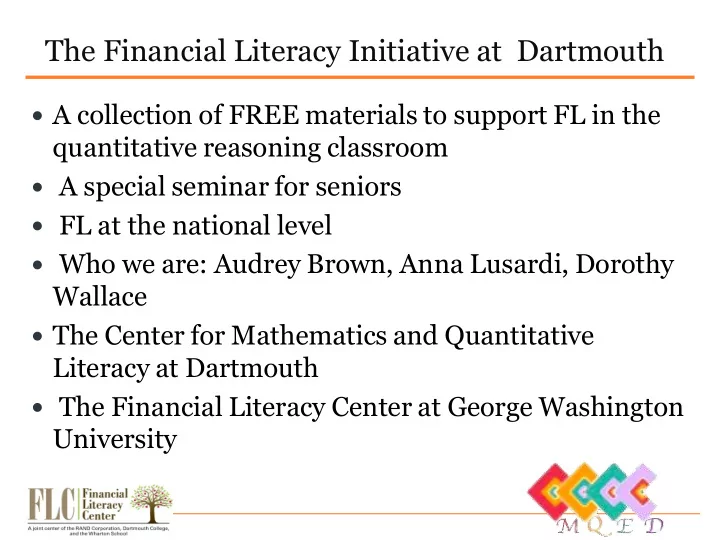

The Financial Literacy Initiative at Dartmouth A collection of FREE materials to support FL in the quantitative reasoning classroom A special seminar for seniors FL at the national level Who we are: Audrey Brown, Anna Lusardi, Dorothy Wallace The Center for Mathematics and Quantitative Literacy at Dartmouth The Financial Literacy Center at George Washington University
Part 1: FREE stuff you can use in your class 2 A series of modules designed to: Emphasize quantitative aspects of financial decisions Use the language of the financial world, the language of mathematics, and the language of ordinary people Give instructors many options for how to use them Appeal to college age adults Address the needs of those doing something for the first time, such as getting a first credit card, first job, first car Treat the learner as an adult, in particular by imitating the business school case study approach and introducing the use of spreadsheets.
What topics are covered? 3 Freestanding modules on the following topics: How much will I take home? Understanding your paystub. Paddle Your Canoe. Budgeting. Understanding Credit Card Offers Jetta or Jaguar? Buying your ideal car Buy, Rent, or Live in a Tent? Mortgages and house purchase. Investing in Savings and Bonds Investing in the Stock Market Investing in Mutual Funds Your Parents Will Move In With You! How much needed to retire. Saving For Retirement NEW! Forthcoming module on taxes.
What is in a module? 4 Every module includes most of these: Slides for presentation, including embedded videos and links, delivered on the web and free to use. Pre and post tests on financial and numerical concepts in the module. Detailed instructor notes with ideas for quantitative assignments, writing assignments, and other educational activities Notes especially for future teachers and those who teach them Spreadsheets for doing realistic calculations and exploring the future impact of financial decisions Case studies of (fictional) individuals so that students can put themselves in the position of financial advisors
Some examples: the slides 5
Instructor notes 6 PHBNI-3 At this point students should be invited to begin creating their own budget based either on their existing income or on income projected for their profession upon graduation. Average incomes for different professions can be found at the Bureau of Labor Statistics. An online salary paycheck calculator, such as PaycheckCity.com will allow students to compute take home pay based on their salary.
Assessment questions 7 From the module, “Saving For Retirement” Assessment question 11 on the pre-test 11. If you have $10,000 invested at 7% per year, and if you add an additional $1,000 this year, then next year you will have approximately: a. 10,000 • .7 + 1,000 b. 10,000• .07 + 1,000 c. 10,000 • 1.07 + 1,000 d. None of the above
Spreadsheets “Your Parents Will Move In With You” 8
Case Studies: “Your Parents Will Move In With You” 9 Downeast Ladies Seek Victorian Cottage Three fabulous single women you know, belles dames of a certain age, have been discussing their imminent retirement. They have been friends for years and are considering sharing an old Victorian house on the main street of a cute town in Maine for their golden years. They are all turning 65, about to collect social security and make their big move. They must all relocate more or less at the same time, because it will take all three of them to pay for and maintain the house they have chosen.
Opportunities for financial education, using the Dartmouth modules 10 These are some of the best places to use these modules: As part of a quantitative reasoning or other math course As part of a financial literacy course As part of faculty development in financial education at high school and college levels In conjunction with financial education games, such as Ne$tEgg or Groove Nation, for informal financial education At moments when life changes, such as for graduating seniors
Part 2: Senior Survival at Dartmouth! 11
Senior Survival at Dartmouth! 12 Last year (Spring 2012) 3 sessions: Budgets, Credit, Other Stuff Joint with Alumni Relations and Math Presenters: Alum John DeRegt, and Heidi Eldred (at Tuck Business School, and spouse of an alumnus) This year (Winter 2013 and Spring 2013) 6 sessions, 3 each quarter Joint with Alumni Relations, Math, and the Rockefeller Center
Senior Survival at Dartmouth! 13 Data (3 sessions combined): 113 out of 132 surveys ranked the sessions as “helpful” or “very helpful” (top two of 5 options) 96 out of 132 surveys said that “about half” to “all” of the material was new to them (top 3 of 5 options) Quite a few students asked for more sessions.
Senior Survival at Dartmouth! 14 This year: Six session total, 3 in Winter, 3 in Spring Video clips of presenters from last year will go online for others to use Tell your Alumni Relations office about this!
Thanks to our collaborators! Kate Sorenson & Peter Mili, Cambridge Rindge and Latin School, Kim Rheinlander, Dartmouth College, Caren Diefenderfer, Hollins University, Janine Lloyd, MassBay Community College, Corrine Taylor, Akila Weerapana, Jessica Polito & Ken Hawes,Wellesley College, Eric Gaze, Bowdoin College, Maryann Allen, Andrew Cahoon, Eva Szalvai, Tom Kealy, & Semra Kilic-Bahi, Colby-Sawyer College, Clyde Martin, Texas Tech University, Andrew Richman and his team (Bonvini, Green, Kershaw, O'Donnell, Salter), John Pelletier, Champlain College, Colleen Andrasko, Retirement Plan Administrator, Dartmouth College, Erin Kanter, Doug Bernstein & Vlad Fichtner, Ne$tEgg, Derrick T. Smith & Martha Beattie, Dartmouth Alumni Relations, John DeRegt, Dartmouth class of „72, Heidi Eldred, Tuck School of Business, Audrey Brown, Dartmouth College, AND Anna Lusardi, Financial Literacy Center, George Washington University
Recommend
More recommend